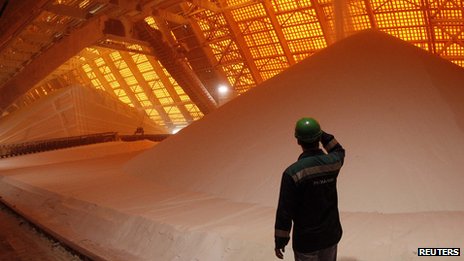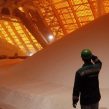
The Potash War: A Sequel
Publication: Eurasia Daily Monitor Volume: 10 Issue: 161
By:

The Belarusian-Russian potassium (potash) war has undergone several new developments. First, it appears that Uralkalii, a Russian potash producer that, in late July, left the joint Russian-Belarusian trader, Belarusian Potassium Company (BPC) (see EDM August 5, September 4), has insured its “management responsibility” risk. Its AIG-provided insurance policy stipulates the possibility of $100 million in compensation for damages resulting from management decisions. This is exactly the amount in damages that the arrested Uralkalii CEO Vladislav Baumgaertner was charged with by Belarus’s Office of the Prosecutor (https://news.tut.by/politics/364581.html).
Second, the Belarusian government established a new potash trader. It bears the old name—the BPC. But unlike its predecessor, it is the exclusive trader of Belaruskalii, the Belarusian potash producer (https://naviny.by/rubrics/economic/2013/09/06/ic_articles_113_182910/).
Third, until December 31, 2013, Belaruskalii is relieved from export duties. The duties amounted to $75–$80 per ton of potash. This will make it easier for the Belarusian producer to compete with its Russian counterpart whose production costs are lower, $60 per ton versus $100 per ton (https://naviny.by/rubrics/economic/2013/09/06/ic_articles_113_182915/).
Fourth, global prices for potash had already declined by 15–20 percent following the breakup of the original BPC, the Belarusian-Russian trader. For example, in Brazil, spot prices of potash have dwindled from $440–$450 to $360–$380 per ton, and Chinese buyers have offered to pay $320 to the North American trader Canpotex. Malaysia and Indonesia are anxiously watching if this deal comes to pass so they can pay $330–$340 per ton. The price decline is going to deprive Belarus of $0.5 billion to $1 billion (https://news.tut.by/economics/365012.html).
Fifth, by some accounts, the standoff between Russia’s Uralkalii and Belarus does indeed cause some confusion among opposition-minded Belarusians (see EDM, September 4). An article in Nasha Niva, the major Belarusian-language opposition newspaper, is titled “How the opposition electorate began to support [President Alyaksandr] Lukashenka” (nn.by/?c=ar&i=114639?). In summary, the opposition welcomed Lukashenka’s decision to arrest the CEO of Uralkalii and to launch an investigation into the dealings of the company’s major shareholder, Russian oligarch Suleiman Kerimov. The article opines that a rapprochement between Belarus and the West may be a potential side effect of the standoff.
Moreover, a talk show devoted to the conflict airing on the Belarusian Service of Radio Liberty was titled “Where does the regime end and the homeland begin?” (https://www.svaboda.org/content/article/25093331.html). The show’s host compared the standoff with World War II, when many in the Soviet Union who knew that Joseph Stalin was a thug nevertheless threw their support behind the dictator as they opted for national mobilization in the face of Nazi aggression. One of the participants of the talk show bemoaned the “irrational sympathy” to the Russian enemies of Lukashenka. The other participant, the Moscow-based Belarusian journalist Victor Dziatlikovich, a correspondent with the Russkii Kourier newspaper, told the audience that he had earlier participated in a radio broadcast on the potash standoff, which aired in Moscow and Moscow Oblast. During that broadcast, listeners were asked whether they sided with Lukashenka or Russian authorities. Eighty-two percent of the respondents expressed their support for the Belarusian president even though Muscovites represent the least Lukashenka-friendly segment of the Russian public. But nevertheless, Russians see Lukashenka as a fighter against Russian oligarchs, whom ordinary people hate—particularly oligarchs with non-Russian names, like Suleiman Kerimov.
Sixth, there are signs that the entourage of Vladimir Putin himself may tacitly support Lukashenka in this standoff. Kerimov is not close to Putin. Rather, he is close to Prime Minister Dmitry Medvedev and particularly to Deputy Prime Minister Arkady Dvorkovich, whose wife works for Kerimov’s corporate groups. In contrast, Igor Sechin, also a deputy prime minister but close to Putin and reclaiming his influence lost during the presidential tenure of Medvedev, openly protested the cut in oil deliveries to Belarus preannounced by Dvorkovich (https://naviny.by/rubrics/economic/2013/09/05/ic_articles_113_182895).
Putin eventually broke his own silence on the issue. During his September 6 press conference devoted to the G20 summit, he was asked about the Russian-Belarusian standoff and his keeping mum about it. Putin’s response was an indirect sign of the possibility of Minsk’s victory. “I did not speak with Lukashenka about this issue,” said Putin. “As for the silence, it is related to our desire to solve this problem, not drive it into a dead end, which is so easy to do if we raise a fuss about it” (https://naviny.by/rubrics/politic/2013/09/06/ic_articles_112_182920/). Andrei Porotnikov, who maintains the “Belarus Security Blog,” believes that Minsk is probably winning the tug of war. Porotnikov sees the statement of Putin’s press secretary Dmitry Peskov as one more confirmation. On September 5, Peskov declared that “relationships between states, especially between the members of the Union State of Russia and Belarus, always have precedence over relationships between […] corporations and entrepreneurs” (https://naviny.by/rubrics/politic/2013/09/06/ic_articles_112_182920/).
Meanwhile, Belarusian investigative journalist Stas Ivashkevich reminded his readers that back in 1997, President Boris Yeltsin sent Prime Minister Yevgeny Primakov, whom Yeltsin did not trust, to Lukashenka to facilitate the release from jail of Pavel Sheremet, a Russian journalist with Belarusian roots. Yeltsin apparently believed that Primakov would fail. But Lukashenka was close to Primakov and demonstratively satisfied his request. Ivashkevich claims that events today may remind those of 1997 in spirit, though not in letter. Specifically, Russia’s current prime minister and his closest associates will fail to free Uralkalii’s CEO Baumgaertner; rather, somebody from Putin’s own entourage will be more likely to achieve this outcome and thus gain political capital (https://naviny.by/rubrics/economic/2013/09/05/ic_articles_113_182895).
Seventh, Baumgaertner’s Belarusian attorneys have failed to appeal their client’s restraining order, and he will therefore remain in jail.
Finally, Belaruskalii’s CEO, Valery Kiriyenko, declared that he could mend his firm’s relationship with Uralkalii only if the latter receives a new owner (https://news.tut.by/politics/364581.html). Within days, media reports appeared suggesting that Kerimov was about to sell his 22-percent package of Uralkalii’s shares. Following this announcement, the value of each share rose by 8 percent (https://en.rian.ru/russia/20130909/183304781/Billionaire-Kerimov-to-Sell-Stake-in-Uralkali–Media-Reports.html).
The potash war, therefore, goes on. But so far there have been few signs that Minsk is losing it.




